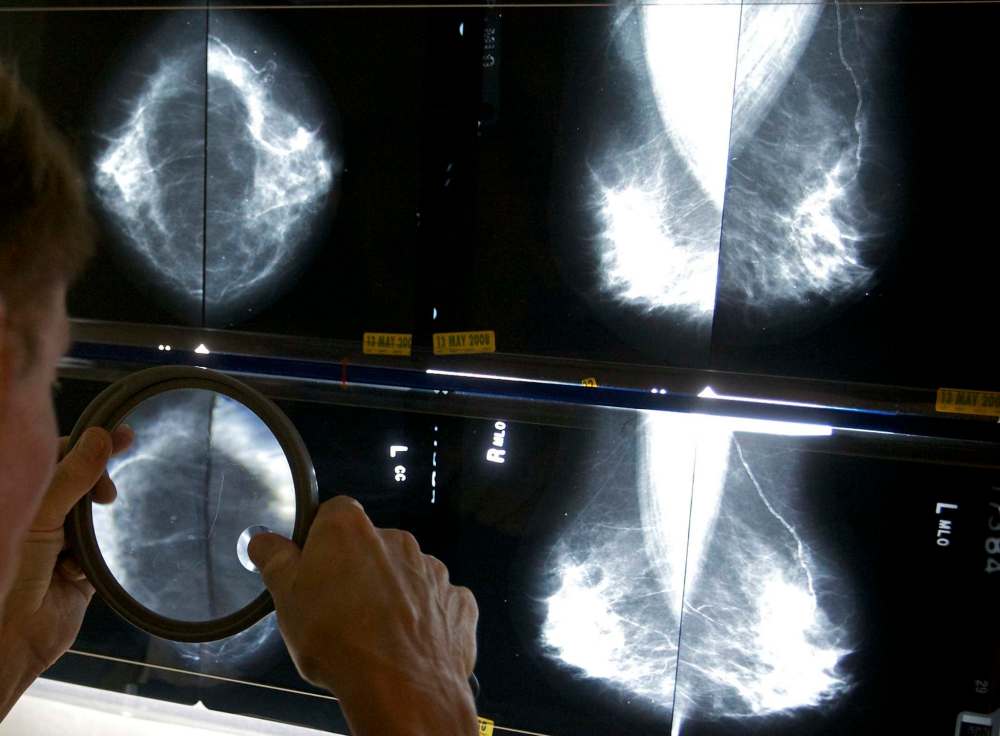Breast-cancer screening does save lives
Advertisement
Read this article for free:
or
Already have an account? Log in here »
To continue reading, please subscribe:
Monthly Digital Subscription
$0 for the first 4 weeks*
- Enjoy unlimited reading on winnipegfreepress.com
- Read the E-Edition, our digital replica newspaper
- Access News Break, our award-winning app
- Play interactive puzzles
*No charge for 4 weeks then price increases to the regular rate of $19.00 plus GST every four weeks. Offer available to new and qualified returning subscribers only. Cancel any time.
Monthly Digital Subscription
$4.75/week*
- Enjoy unlimited reading on winnipegfreepress.com
- Read the E-Edition, our digital replica newspaper
- Access News Break, our award-winning app
- Play interactive puzzles
*Billed as $19 plus GST every four weeks. Cancel any time.
To continue reading, please subscribe:
Add Free Press access to your Brandon Sun subscription for only an additional
$1 for the first 4 weeks*
*Your next subscription payment will increase by $1.00 and you will be charged $16.99 plus GST for four weeks. After four weeks, your payment will increase to $23.99 plus GST every four weeks.
Read unlimited articles for free today:
or
Already have an account? Log in here »
Hey there, time traveller!
This article was published 17/10/2017 (2948 days ago), so information in it may no longer be current.
Breast cancer is the most commonly diagnosed cancer in Manitoba women and the leading cause of cancer death. This year, about 900 Manitoba women will be diagnosed with breast cancer. While many treatment advances have been made in recent years and efforts are continuing to improve outcomes, 190 Manitoba women are expected to die from the disease in 2017.
CancerCare Manitoba has offered breast cancer screening since 1995. Research shows regular mammograms reduce deaths from breast cancer in women 50 to 74 years of age by 20 to 30 per cent. Most breast cancers discovered through regular screening are found at an earlier stage when there may be simpler treatment, more treatment options and less need for chemotherapy. When cancer is treated at an early stage there is also a better chance of survival or a cure.
A mammogram is an X-ray of the breasts using very low-dose radiation. The amount of radiation from a mammogram is about the same as a five-hour flight. Research shows the risk of getting a cancer caused by the radiation from a mammogram is extremely low. CancerCare Manitoba believes the benefits of early diagnosis of breast cancer through screening mammograms outweigh this harm.

CancerCare Manitoba’s breast screening program is called BreastCheck. Each year 50,000 women are screened through BreastCheck sites in Winnipeg, Brandon, Winkler/Morden and Thompson. In addition, a mobile mammography vehicle travels to communities throughout Manitoba. Since the program began 22 years ago, BreastCheck has found 5,000 cases of breast cancer in Manitoba women.
In 2015, digital mammography was introduced in the province. The digital process uses less radiation, which helps reduce a woman’s lifetime exposure to X-rays from mammography. With digital mammograms there is no film to develop, if an image is unclear, the mammogram can be retaken immediately. This reduces the callbacks for re-takes and helps reduce anxiety.
CancerCare Manitoba’s BreastCheck program follows scientific evidence and the guidelines set by the Canadian Task Force on Preventive Health Care. CancerCare Manitoba recommends most women age 50 to 74 should have a screening every two years. This recommendation does not apply to women with a significant family history of breast cancer or the BRCA mutation.
The benefits of screening mammograms in preventing death from breast cancer have been demonstrated repeatedly in many clinical trials. These clinical trials also revealed the risk of unnecessary tests, false-positives, the over-diagnosis of cancer and the stress this causes the woman and her family. About five out of every 100 women screened at CancerCare Manitoba‘s BreastCheck program are sent for further tests. Only one of these women will be diagnosed with breast cancer.
Every woman should have a frank conversation with her family doctor about her medical history and the risks and benefits of a screening mammogram in order to make an informed decision. CancerCare Manitoba’s Breast and Gyne Cancer Centre of Hope provides information and emotional support to women and their families who are concerned about breast health and related issues.
Unfortunately, not all breast cancers found through screening can be cured. Some women will die of breast cancer even if it has been detected by a screening mammogram. Thankfully, other women who screen positive with cancer will go on to live long lives without breast cancer shortening their lifespan. One of the questions for researchers is why the outcomes are for these women are so different. At CancerCare Manitoba, we believe it is only through further research conducted at centres like the Research Institute at CancerCare Manitoba that we may one day have the answers to this and other cancer questions.
Manitoba women who have concerns or questions should contact BreastCheck at CancerCare Manitoba (GetChecked@cancercare.mb.ca or 1-855-95-CHECK) or speak with their doctor.
Sri Navaratnam is president and CEO of CancerCare Manitoba.

